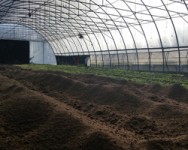Event Details
Date
September 13, 2017
Time
5:00 PM - 6:30 PM
Location
Poughkeepsie Farm Project
51 Vassar Farm Lane
Poughkeepsie, NY 12603
Cost
$15.00 /individual
$25.00 for two or more people from the same farm
Host
NOFA-NY
NOFA-NY On-Farm Field Days
Best Management Practices for High Tunnel Nutrition and Soil Health
September 13, 2017
Soil tests, foliar tests, foliar feeds, fertigation, managing for yield, long term soil health in a high tunnel isn't a simple process. It can have a lot of components and require a fair amount of analysis. Leon Vehaba is a long-time grower and will share some of his tips, tricks and lessons learned. Cornell Cooperative Extension, partnering with NOFA-NY in a New York Farm Viability Institute funded project, have been working to identify long-term soil health and fertility best management practices. We will share what has been learned at the Poughkeepsie Farm Project and at other farms across the state in a conversation focused on development of best management practices.
This event is produced by NOFA-NY with support from the New York Farm Viability Institute.
This is one of the 2017 On-Farm Field Days hosted by NOFA-NY. Pre-registration is strongly encouraged for all field days, if you will be paying with a credit card. If paying with cash or check, you will register on-site. There is no need to pre-register online if paying with cash or check, just show up!
Enter your information to see details on each Field Day, and register for those you are interested in! All costs will be $15/individual, $25 for two or more people from same farm, unless otherwise noted.



































